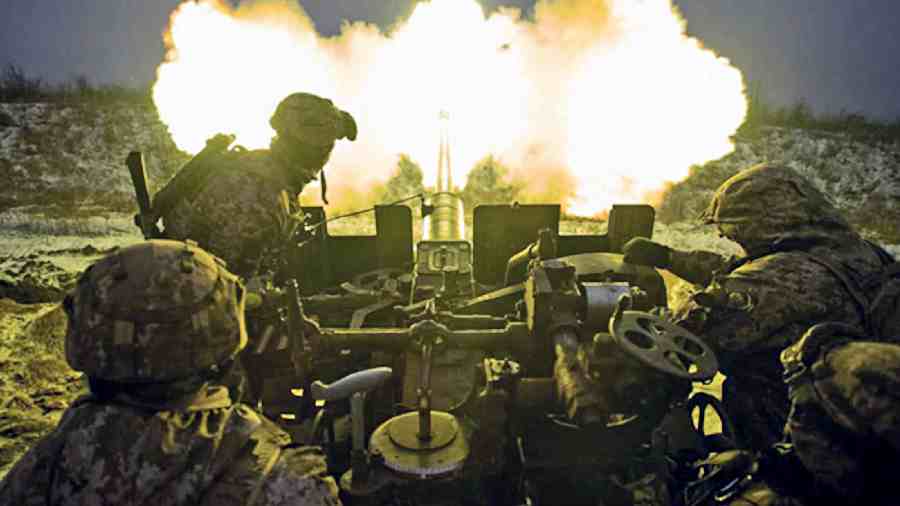February 24 marks the first anniversary of the current ‘conflict’ in Ukraine. The Russian seizure of Crimea also took place this month nine years ago. The different terms used to describe the conflict are loaded and suggestive of the political positions taken on the entire issue. For the West in general, what is taking place is a war and an invasion. For Russia, what began on February 24 was a ‘special military operation’; in brief, not a war.
Regardless of the semantics, although they are important, Europe is currently in a state few could have imagined earlier. For most Europeans, the war or the conflict is the return of the spectre of interstate military contestation long believed to have been banished and buried with the fall of the Berlin Wall, the end of the Cold War, and the disintegration of the Soviet Union. A military contest between European nations had become a prospect that was no longer relevant to the future course of European history.
Furious debates have raged alongside the tactical swings in the military situation in Ukraine. Were its origins to be found in a deeper Russian malaise — an imperial impulse to dominate its entire periphery and, in particular, those who had once constituted part of the Soviet Union? This view held that Russia was going on the offensive. Not standing up to it would be tantamount to ‘appeasement’ — a dreaded term of abuse in the West as it evokes the ghost of Munich in 1938. The contrarian view is equally persuasive: the Russian action was a defensive move to ringfence itself from a NATO expanding ever closer to Russia’s frontiers.
There is a parallel perspective that sees the conflict in terms wider than the geopolitical context. In this view, the war is a struggle between Absolutism and Democracy. For its protagonists, the aim is to evoke memories of World War II. In Russia, too, the official narrative pitches an existential clash — a third patriotic war following the Napoleonic and Nazi invasions of the 1800s and the 1940s.
Other issues, too, have emerged over the past year. The most obvious is the failure of diplomacy in Europe, ironic given the premium Europeans have placed on diplomacy and how much intra-European debate on themes such as balance of power, spheres of interest and others had come to dominate the discipline of international relations since its founding. The failure is even more striking given the long gestation of this crisis. There was sufficient knowledge of the issues at stake on both sides of the divide. This first inter-state war in Europe since World War II also underscores how far its diplomacy has failed. It has become apparent that modern diplomacy remains a weak instrument, even in the continent of its founding, when set against the forces of ethnicity and nationalism.
Alongside this is the significant underperformance of the Russian military to secure battlefront gains that would have enabled the declaration of a political victory. For military planners in the West, this failure will long be examined. In Russia, there is some effort to rationalise this by pointing to the enormous military support being provided to Ukraine by the United States of America and many countries in Europe. This is, evidently, a proxy war; even so, it remains a demonstration of the difficulties that conventional forces face in holding swathes of territory in the absence of a political envelop to sustain them and in the face of determined resistance.
Over the past year, there has also been, once more, a demonstration of the failures of sanctions. Quite regardless of the long-term costs being imposed on the Russian economy by the scale and spread of the sanctions imposed, the point is that they have been ineffective in even incrementally advancing the political agenda that underwrote them. This was not unexpected. Last year was the 60th anniversary of the longest standing sanctions regime in existence — the US trade embargo on Cuba. Its critics point to its humanitarian consequences but the fact is that the embargo failed in achieving its political goals as set out — at the very least to bring about a change in Cuba’s behavior. Similarly, other sanctions regimes, such as those against Iran and Myanmar, have been ineffective in changing the policy direction of a country once its leadership is determined not to oblige and face the consequences.
As Russia and Ukraine slog it out, there are other threads that have emerged over the past year. For instance, the Russian underestimation of Ukraine’s resolve and capacity to resist. This provides, once again, a classic depiction of policy failures that emerge from seeing the world as you would wish it to be rather than as it is. Perhaps many in Ukraine also rue not being sufficiently heedful of the insecurities of a larger neighbour. With a year past and no end in sight, what remains without any doubt is that these two countries have been the greatest losers.
History, hubris, nationalism and external configurations have pushed them to a place where, given a choice, they would have preferred not to be. How, then, should we in India view this faraway conflict, which has also had many consequences for us? The year has been dominated by balancing conflicting demands and expectations from Russia and the US and its allies. This is not a new place for Indian diplomacy. But there is a larger point about this conflict — and not one to do with geopolitics or a clash of values. To put it simply: the Russia-Ukraine conflict is happening in Europe, the cradle of modern diplomacy. Neither country possibly ever wanted the situation they’ve found themselves in now. The obvious lesson is that difficult neighbourhoods have to be handled with caution and care and with common sense underwriting pragmatic diplomacy.
T.C.A. Raghavan is a former Indian High Commissioner to Singapore and Pakistan











